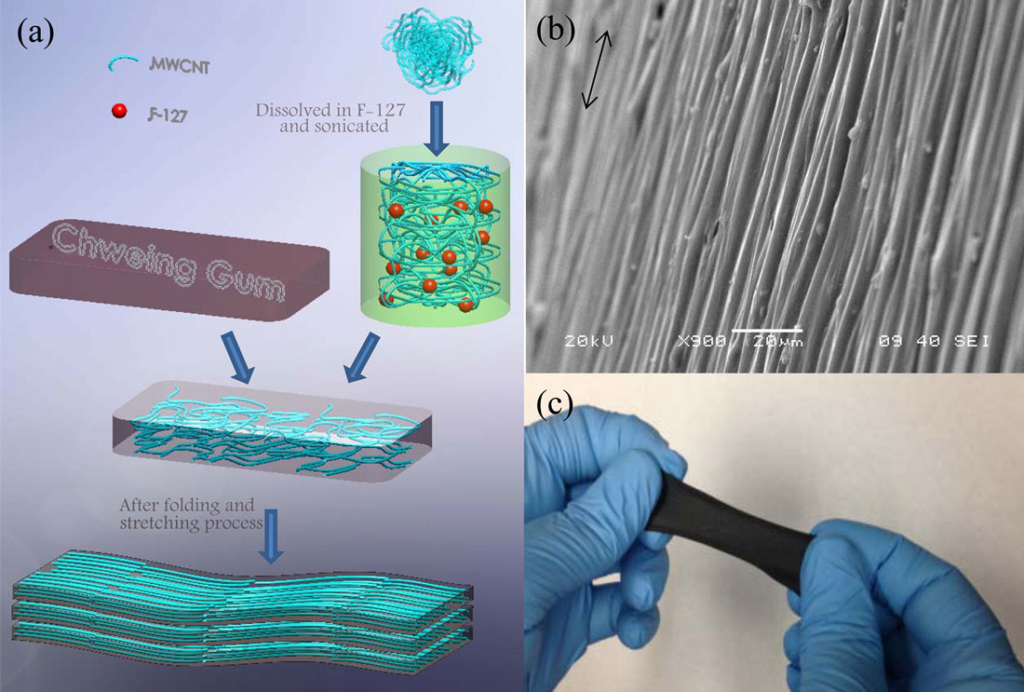New stretchable, wearable sensor made with chewing gum
Body sensors, which were once restricted to doctors’ offices, have come a long way. They now allow any wearer to easily track heart rate, steps and sleep cycles around the clock. Soon, they could become even more versatile — with the help of chewing gum.

New stretchable, wearable carbon nanotube sensor made with chewing gum. Nanowerk. (a) Schematic diagram of the preparation method for the MWCNT/gum membrane. (b) SEM image of the MWCNT/gum membrane cross-section (the arrow shows the stretch direction). (c) Optical image of the MWCNT/gum membrane (6 wt % MWCNT). © American Chemical Society.
Scientists report in the journal ACS Applied Materials & Interfaces a unique sensing device made of gum and carbon nanotubes that can move with your most bendable parts and track your breathing.
Most conventional sensors today are very sensitive and detect the slightest movement, but many are made out of metal. That means when they’re twisted or pulled too much, they stop working. But for sensors to monitor the full range of a body’s bending and stretching, they need a lot more give. To meet that need, some researchers have tried developing sensors using stretchy plastics and silicones. But what they gained in flexibility, they lost in sensitivity. Malcolm Xing and colleagues found a better solution right under their noses — and in their mouths.
To make their supple sensor, a team member chewed a typical piece of gum for 30 minutes, washed it with ethanol and let it sit overnight. The researchers then added a solution of carbon nanotubes, the sensing material. Simple pulling and folding coaxed the tubes to align properly. Human finger-bending and head-turning tests showed the material could keep working with high sensitivity even when strained 530 percent. The sensor also could detect humidity changes, a feature that could be used to track breathing, which releases water vapor with every exhale.
Mohammad Ali Darabi, Ali Khosrozadeh, Quan Wang, and Malcolm Xing work in the Department of Mechanical and Manufacturing Engineering, University of Manitoba, Winnipeg Canada. Malcolm Xing also works in the Department of Biochemistry and Medical Genetics, Children’s Hospital Research Institute of Manitoba.
| A new, super stretchy sensor is on its way thanks to an unexpected pairing of chewing gum and carbon nanotubes. Their research appears in ACS Applied Materials & Interfaces, a publication of the American Chemical Society. YouTube Dec 1, 2015 |
Source ACS Applied Materials and Interfaces American Chemical Society
Via Flexible sensor made from chewing gum promises sensitive and versatile wearables Gizmag
| References |
Gum Sensor: A Stretchable, Wearable, and Foldable Sensor Based on Carbon Nanotube/Chewing Gum Membrane, Darabi MA, Khosrozadeh A, Wang Q, Xing M. ACS Appl Mater Interfaces. 2015 Dec 2;7(47):26195-205. doi: 10.1021/acsami.5b08276. Epub 2015 Nov 17.
A Degradable-Renewable Ionic Skin Based on Edible Glutinous Rice Gel, Tian S, Xing Y, Long Y, Guo H, Xu S, Ma Y, Wen C, Li Q, Liu X, Zhang L, Yang J. ACS Appl Mater Interfaces. 2022 Feb 2;14(4):5122-5133. doi: 10.1021/acsami.1c24352. Epub 2022 Jan 20.
Also see
Track your fitness using CHEWING GUM: Sensor can be twisted and stretched and is so sensitive it monitors breathing The Daily Mail






